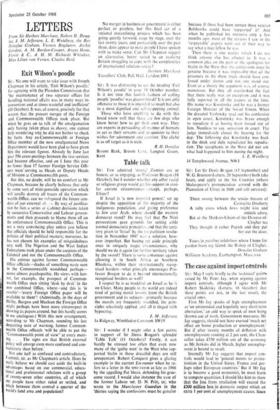Exit Wilson's poodle
LETTERS
From Sir Herbert Marchant, Robert H. Doug- las, J. M. Jefferson, L. E. Weidberg, the Rev Douglas Graham, Vernon Bogdanor, Archie Gordon, A. M. Burdon-Cooper, Angus Hone, Florio & C., A. H. M. Richards Whitaker, Miss Lilian von Versen, Charles Reid.
Sir: No one will want to take issue with Joseph Chapman in his article, 'Exit Wilson's poodle,' for agreeing with the Plowden Commission that 'the maintenance of two separate offices for handling national affairs was in many ways in- convenient and at times wasteful and inefficient' (18 October). It was, of course, precisely for that reason that the present merger of the Foreign and Commonwealth Offices took place. But when he goes on to talk of the amalgamation only having taken place in theory, one cannot help wondering why he did not bother to check his facts. Any ex-Commonwealth or Foreign Office member of the now amalgamated News Department would have been glad to have given him the relevant figures. Already by June last year 596 cross-postings between the two services had become effective, and on 1 June this year no fewer than 17 former Foreign Service Offi- cers were' serving as Heads or Deputy Heads of Mission at Commonwealth posts.
But this, no doubt, will be no comfort to Mr Chapman, because he clearly believes that only by some sort of mini-genocide operation which will totally destroy all traces of the Common- wealth Office, can we safeguard the future con-
duct of our external By way of justifica- tion he lists a series of Cabinet decisions taken by successive Conservative and Labour govern- ments and then proceeds to blame them all on the unfortunate Commonwealth Office. This is not a very convincing ploy unless you believe that officials should be held responsible for the policies of their political masters; moreover, he has not chosen his examples of misguidedness very well. The Nigerian and the West Indian Federations took place under the auspices of the Colonial and not the Commonwealth Office.
His animus against former Commonwealth Office officials—shades of something nasty seen in the Commonwealth woodshed perhaps— seems almost psychopathic. He views with hor- ror, for example, the prospect of Common- wealth Office men sitting 'desk by desk' in the new combined Office, where—and this is 'le comble'—'every Foreign Office paper will be available to them'! (Admittedly, in the days of Philby, Burgess and Maclean the Foreign Office might perhaps have been more circumspect in showing its papers around, but this hardly seems to me analogous.) With this new arrangement, according to Mr Chapman, sounding his last despairing note of warning, former Common- wealth Office officials 'will be able to put the "Commonwealth point of view" at every meet- ing. • . . The signs are that British external Policy will emerge even more confused and con- tradictory than before.'
Not one half as confused and contradictory, I submit, sir, as Mr Chapman's article. Does he really believe we should cast aside the built-in advantages based on our commercial, educa- tional and professional relations with a group of twenty-seven other countries, all of which our people have either ruled or settled, and which between them control a quarter of the world's land area and population?
No merger in business or government is either perfect or painless, but this final act of a rational streamlining process which has been going quietly forward, stage by stage, over the last twenty years, and particularly over the past three, does appear to most people I have spoken with to make sense. Can Mr Chapman suggest an alternative, better suited to an evolving Britain struggling to cope with the complexities of international relations today?














































 Previous page
Previous page